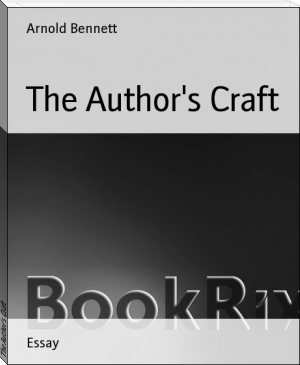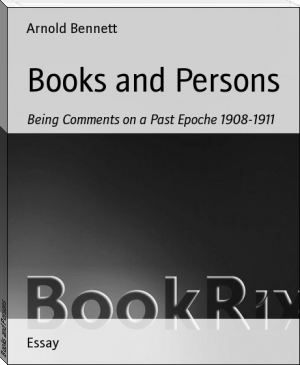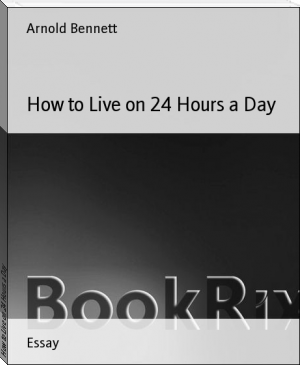The Author's Craft - Arnold Bennett (knowledgeable books to read TXT) 📗

- Author: Arnold Bennett
Book online «The Author's Craft - Arnold Bennett (knowledgeable books to read TXT) 📗». Author Arnold Bennett
PART IV
THE ARTIST AND THE PUBLIC
I
I can divide all the imaginative writers I have ever met into two classes--those who admitted and sometimes proclaimed loudly that they desired popularity; and those who expressed a noble scorn or a gentle contempt for popularity. The latter, however, always failed to conceal their envy of popular authors, and this envy was a phenomenon whose truculent bitterness could not be surpassed even in political or religious life. And indeed, since (as I have held in a previous chapter) the object of the artist is to share his emotions with others, it would be strange if the normal artist spurned popularity in order to keep his emotions as much as possible to himself. An enormous amount of dishonest nonsense has been and will be written by uncreative critics, of course in the higher interests of creative authors, about popularity and the proper attitude of the artist thereto. But possibly the attitude of a first-class artist himself may prove a more valuable guide.
The _Letters of George Meredith_ (of which the first volume is a magnificent unfolding of the character of a great man) are full of references to popularity, references overt and covert. Meredith could never--and quite naturally--get away from the idea of popularity. He was a student of the English public, and could occasionally be unjust to it. Writing to M. Andre Raffalovich (who had sent him a letter of appreciation) in November, 1881, he said: "I venture to judge by your name that you are at most but half English. I can consequently believe in the feeling you express for the work of an unpopular writer. Otherwise one would incline to be sceptical, for the English are given to practical jokes, and to stir up the vanity of authors who are supposed to languish in the shade amuses them." A remark curiously unfair to the small, faithful band of admirers which Meredith then had. The whole letter, while warmly and touchingly grateful, is gloomy. Further on in it he says: "Good work has a fair chance to be recognised in the end, and if not, what does it matter?" But there is constant proof that it did matter very much. In a letter to William Hardman, written when he was well and hopeful, he says: "Never mind: if we do but get the public ear, oh, my dear old boy!" To Captain Maxse, in reference to a vast sum of L8,000 paid by the _Cornhill_ people to George Eliot (for an unreadable novel), he exclaims: "Bon Dieu! Will aught like this ever happen to me?"
And to his son he was very explicit about the extent to which unpopularity "mattered": "As I am unpopular I am ill-paid, and therefore bound to work double tides, hardly ever able to lay down the pen. This affects my weakened stomach, and so the round of the vicious circle is looped." (Vol. I., p. 322.) And in another letter to Arthur Meredith about the same time he sums up his career thus: "As for me, I have failed, and I find little to make the end undesirable." (Vol. I., p. 318.) This letter is dated June 23rd, 1881. Meredith was then fifty-three years of age. He had written _Modern Love_, _The Shaving of Shagpat_, _The Ordeal of Richard Feverel_, _Rhoda Fleming_, _The Egoist_ and other masterpieces. He knew that he had done his best and that his best was very fine. It would be difficult to credit that he did not privately deem himself one of the masters of English literature and destined to what we call immortality. He had the enthusiastic appreciation of some of the finest minds of the epoch. And yet, "As for me, I have failed, and I find little to make the end undesirable." But he had not failed in his industry, nor in the quality of his work, nor in achieving self-respect and the respect of his friends. He had failed only in one thing--immediate popularity.
II
Assuming then that an author is justified in desiring immediate popularity, instead of being content with poverty and the unheard plaudits of posterity, another point presents itself. Ought he to limit himself to a mere desire for popularity, or ought he actually to do something, or to refrain from doing something, to the special end of obtaining popularity? Ought he to say: "I shall write exactly what and how I like, without any regard for the public; I shall consider nothing but my own individuality and powers; I shall be guided solely by my own personal conception of what the public ought to like"? Or ought he to say: "Let me examine this public, and let me see whether some compromise between us is not possible"?
Certain authors are never under the necessity of facing the alternative. Occasionally, by chance, a genius may be so fortunately constituted and so brilliantly endowed that he captures the public at once, prestige being established, and the question of compromise never arises. But this is exceedingly rare. On the other hand, many mediocre authors, exercising the most complete sincerity, find ample appreciation in the vast mediocrity of the public, and are never troubled by any problem worse than the vagaries of their fountain-pens. Such authors enjoy in plenty the gewgaw known as happiness. Of nearly all really original artists, however, it may be said that they are at loggerheads with the public--as an almost inevitable consequence of their originality; and for them the problem of compromise or no-compromise acutely exists.
George Meredith was such an artist. George Meredith before anything else was a poet. He would have been a better poet than a novelist, and I believe that he thought so. The public did not care for his poetry. If he had belonged to the no-compromise school, whose adherents usually have the effrontery to claim him, he would have said: "I shall keep on writing poetry, even if I have to become a stockbroker in order to do it." But when he was only thirty-three--a boy, as authors go--he had already tired of no-compromise. He wrote to Augustus Jessopp: "It may be that in a year or two I shall find time for a full sustained Song.... The worst is that having taken to prose delineations of character and life, one's affections are divided.... And in truth, being a servant of the public, _I must wait till my master commands before I take seriously to singing_." (Vol. I., p. 45.) Here is as good an example as one is likely to find of a first-class artist openly admitting the futility of writing what will not be immediately read, when he can write something else, less to his taste, that will be read. The same sentiment has actuated an immense number of first-class creative artists, including Shakspere, who would have been a rare client for a literary agent.... So much for refraining from doing the precise sort of work one would prefer to do because it is not appreciated by the public.
There remains the doing of a sort of work against the grain because the public appreciates it--otherwise the pot-boiler. In 1861 Meredith wrote to Mrs Ross: "I am engaged in extra potboiling work which enables me to do this," i.e., to write an occasional long poem. (Vol. I., p. 52.) Oh, base compromise! Seventeen years later he wrote to R.L. Stevenson: "Of potboilers let none speak. Jove hangs them upon necks that could soar above his heights but for the accursed weight." (Vol. I., p. 291.) It may be said that Meredith was forced to write potboilers. He was no more forced to write potboilers than any other author. Sooner than wallow in that shame, he might have earned money in more difficult ways. Or he might have indulged in that starvation so heartily prescribed for authors by a plutocratic noble who occasionally deigns to employ the English tongue in prose. Meredith subdued his muse, and Meredith wrote potboilers, because he was a first-class artist and a man of profound common sense. Being extremely creative, he had to arrive somehow, and he remembered that the earth is the earth, and the world the world, and men men, and he arrived as best he could. The great majority of his peers have acted similarly.
The truth is that an artist who demands appreciation from the public on his own terms, and on none but his own terms, is either a god or a conceited and impractical fool. And he is somewhat more likely to be the latter than the former. He wants too much. There are two sides to every bargain, including the artistic. The most fertile and the most powerful artists are the readiest to recognise this, because their sense of proportion, which is the sense of order, is well developed. The lack of the sense of proportion is the mark of the _petit maitre_. The sagacious artist, while respecting himself, will respect the idiosyncrasies of his public. To do both simultaneously is quite possible. In particular, the sagacious artist will respect basic national prejudices. For example, no first-class English novelist or dramatist would dream of allowing to his pen the freedom in treating sexual phenomena which Continental writers enjoy as a matter of course. The British public is admittedly wrong on this important point--hypocritical, illogical and absurd. But what would you? You cannot defy it; you literally cannot. If you tried, you would not even get as far as print, to say nothing of library counters. You can only get round it by ingenuity and guile. You can only go a very little further than is quite safe. You can only do one man's modest share in the education of the public.
In Valery Larbaud's latest novel, _A.O. Barnabooth,_ occurs a phrase of deep wisdom about women: "_La femme est une grande realite, comme la guerre_." It might be applied to the public. The public is a great actuality, like war. If you are a creative and creating artist, you cannot ignore it, though it can ignore you. There it is! You can do something with it, but not much. And what you do not do with it, it must do with you, if there is to be the contact which is essential to the artistic function. This contact may be closened and completed by the





Comments (0)